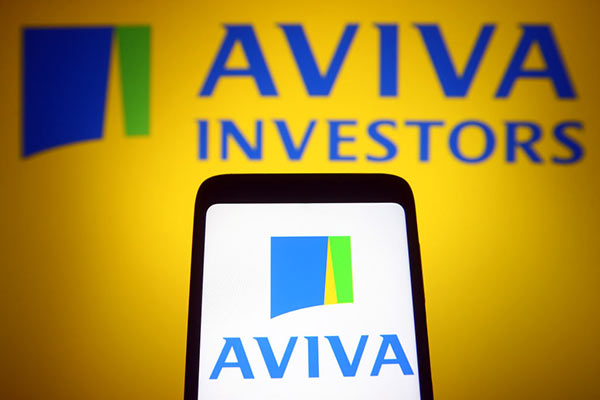ii view: high yielder Aviva beats profit forecasts
An insurance and investments company trading near a six-year high and offering a highly attractive dividend yield. Buy, sell, or hold?
14th August 2024 11:31
by Keith Bowman from interactive investor

First-half results to 30 June
- General insurance premiums are up 15% to £6 billion
- Wealth and Retirement sales up 12% to £19.7 billion
- Operating profit up 14% to £875 million
- Interim dividend up 7% to 11.9p
- Capital cushion or solvency II ratio of 205%, down from 207% in Q4 2023
Guidance:
- Continues to target £2 billion of operating profit by 2026, up from £1.47 billion in 2023
Chief executive Amanda Blanc said:
“Sales are up. Operating profit is up. The dividend is up. Our plan to deliver more for customers and shareholders is working really well.
“We remain very positive about Aviva’s prospects. Trading conditions across the UK, Ireland and Canada, are excellent. And the UK market, our largest, is highly attractive and growing.”
- Invest with ii: What is a Managed ISA? | Open a Managed ISA | Top UK Shares
ii round-up:
Insurance and savings provider Aviva (LSE:AV.) today outlined first-half results that beat City expectations, driven by a better-than-expected performance from general insurance.
Operating profit for the six months to end of June improved 14% to £875 million compared with analyst expectations of around £854 million. General insurance premiums climbed 15% to £6 billion, with premiums for the UK and Irish business up 18% at £3.8 billion.
Shares in the FTSE 100 company have traded either side of break-even in UK trading having come into these latest results up 12% year-to-date. That’s ahead of a 7% improvement for the FTSE 100 index itself over that time. Shares in Asia-focused Prudential (LSE:PRU) are down 28% so far in 2024.
Aviva provides savings, retirement pension products and general insurance including car and home cover to over 19 million customers across the UK, Ireland, and Canada.
The combined ratio for the UK and Irish General Insurance business, a measure of underwriting profitability in which a figure below 100% indicates a profit, improved to 95.8% from 96.3% in the first six months of 2023.
Wealth and Retirement sales climbed 12% to £19.7 billion, aided by £5 billion of net fund inflows. Total Assets Under Management increased to £186 billion from £170 billion in late December.
The interim dividend rises 7% year-over-year to 11.9p per share, although no new share buyback is confirmed following the £300 million programme executed during the half-year.
Broker Morgan Stanley reiterated its ‘overweight’ stance on the shares post the results, flagging a price target of 560p per share.
A third-quarter trading update is scheduled for 14 November.
ii view:
Tracing its history back more than 300 years, Aviva today employs over 25,000 people. Competing against rivals such as Legal & General Group (LSE:LGEN) and Phoenix Group Holdings (LSE:PHNX), company goals over recent years have included becoming a simpler, more competitive, and more commercial company. Business sales in recent years have included its French and Italian operations as well as the disposal of its Singapore joint venture.
For investors, higher bank deposit rates currently offer a more realistic alternative to saving with its Wealth business. Exposure to general insurance leaves it calculating risks in relation to unknown events such as wildfires in Canada and increased flooding from climate change, while geographical diversity has been reduced following various business sales.
- Sign up to our free newsletter for share, fund and trust ideas, and the latest news and analysis
- eyeQ: two bellwether stocks to watch
- Why the UK rally has legs - and what we’re buying
On the upside, product diversity remains high. Easing inflation is likely to have aided previously elevated motoring claims given factors such as higher car part costs and longer repair times due to supply chain challenges and the impact of the pandemic. A government transfer of responsibility to individuals to save for their own pensions is likely aiding demand, while Aviva’s capital cushion, or Solvency II ratio of over 200% remains robust.
For now, and despite ongoing risks, a focus on operational efficiency and a forecast dividend yield of over 7% will likely mean Aviva remains attractive to investors.
Positives:
- Targeting costs
- Attractive dividend yield (not guaranteed)
Negatives:
- Reduced geographical diversity
- General insurance is subject to events outside management’s control
The average rating of stock market analysts:
Strong hold
These articles are provided for information purposes only. Occasionally, an opinion about whether to buy or sell a specific investment may be provided by third parties. The content is not intended to be a personal recommendation to buy or sell any financial instrument or product, or to adopt any investment strategy as it is not provided based on an assessment of your investing knowledge and experience, your financial situation or your investment objectives. The value of your investments, and the income derived from them, may go down as well as up. You may not get back all the money that you invest. The investments referred to in this article may not be suitable for all investors, and if in doubt, an investor should seek advice from a qualified investment adviser.
Full performance can be found on the company or index summary page on the interactive investor website. Simply click on the company's or index name highlighted in the article.